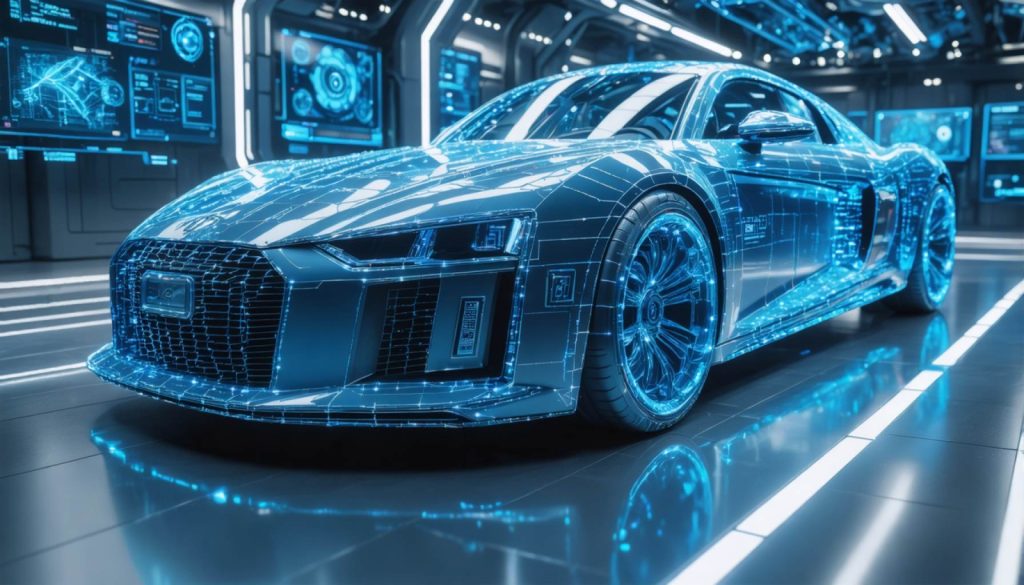
- Blockchain technology is transforming the automotive industry by offering unparalleled transparency and security.
- The automotive blockchain market is expected to grow at a 28.5% CAGR, reaching $3,595 million by 2030.
- Blockchain enhances vehicle lifecycle management by providing an immutable record of each vehicle’s history, combating fraud and tampering.
- North America leads in blockchain integration, with key players like Ford, GM, and Tesla, while Asia-Pacific emerges as an innovation hub.
- Challenges in integrating blockchain with existing systems and lack of industry standards must be addressed for seamless adoption.
- Blockchain supports secure data exchange for connected and autonomous vehicles, safeguarding against data breaches.
- The technology is pivotal in managing electric vehicle (EV) supply chains, ensuring transparency and efficiency.
- Blockchain promises a smarter, more trustworthy automotive future, marking a pivotal shift for the sector.
The automotive industry stands at the cusp of a technological revolution, with blockchain at the heart of this transformation. Imagine a world where each vehicle’s journey is tracked with pristine accuracy, its parts traced back to their origins with impeccable detail, and transactions completed with absolute security. This is not the script of a futuristic movie but the impending reality ushered in by blockchain technology.
The automotive blockchain market is poised for meteoric growth, anticipating an astonishing 28.5% compound annual growth rate (CAGR) to reach a staggering $3,595 million by 2030. Such exponential growth reflects blockchain’s unrivaled potential to reshape the auto sector, from supply chains to sales floors.
Why is blockchain the shining knight in today’s automotive narrative? At its core lies blockchain’s ability to forge unshakeable trust. In an industry plagued by counterfeit parts and opaque supply chains, blockchain casts light, offering a transparent, secure ledger accessible to all authorized parties. This technology vouches for the authenticity of every component, ensuring that vehicles are safe and reliable.
Beyond mere verification, blockchain significantly boosts vehicle lifecycle management. It immutably records a car’s history, detailing everything from previous owners to accident reports. This ledger is not only a tool for buyers to make informed decisions but a fortress protecting against fraud. Blockchain’s immutable nature becomes a shield against tampering, providing unmatched reliability in vehicle histories.
The regional landscape of this technological surge is as varied as it is promising. North America leads the charge, buoyed by automotive titans like Ford, GM, and Tesla. These giants are integrating blockchain to enhance transparency and security, setting a benchmark for innovation. Meanwhile, Asia-Pacific is no passive player. With nations like China, Japan, and South Korea ardently embracing blockchain, the region is destined to become a hotbed of digital automotive innovation, especially in electric and autonomous vehicles.
Yet, this road to transformation is not without hurdles. The complexity of meshing blockchain with existing systems poses a formidable challenge. Automakers often find themselves navigating a labyrinth of technical integration, compounded by a dearth of industry-wide standards. This lack of standardization risks fragmentation, as disparate blockchain systems may struggle to interoperate seamlessly.
Nonetheless, the lure of blockchain triumphs over these difficulties. Its promise of secure data exchange aligns perfectly with the burgeoning demand for connected and autonomous vehicles. As these vehicles become the norm, the data they generate grows exponentially. Here, blockchain emerges as the sentinel, guarding against data breaches and ensuring privacy.
Electric vehicles (EVs), too, present a golden opportunity for blockchain. As the world shifts towards sustainability, managing the intricacies of battery supply chains and charging infrastructure becomes crucial. Blockchain’s ledger system ensures a traceable, transparent path from production to the consumer, enhancing both accountability and efficiency.
In conclusion, the automotive sector stands on the brink of a blockchain-driven metamorphosis. The blend of transparency, security, and efficiency promised by blockchain could redefine how we build, buy, and use cars. This union of technology promises not just a more secure automotive world but a smarter, more trustworthy future on the roads ahead. As blockchain continues to gain traction, the excitement surrounding its potential applications only intensifies. For those invested in the future of automobiles, keeping a keen eye on blockchain developments is not just recommended—it’s essential.
The Hidden Revolution: How Blockchain is Driving Unprecedented Change in the Automotive Industry
Understanding Blockchain’s Role in the Automotive Industry
Blockchain technology is on the brink of transforming the automotive sector, and its applications extend far beyond what is traditionally understood. With an anticipated 28.5% compound annual growth rate (CAGR), the automotive blockchain market aims to reach $3,595 million by 2030. This surge is driven by blockchain’s potential to revolutionize supply chains, enhance vehicle lifecycle management, and improve data security in the automotive industry.
How Blockchain Enhances Automotive Supply Chains
1. Transparency and Authenticity: Blockchain offers a transparent, immutable ledger, which combats counterfeit parts and ambiguous supply chains. Essentially, it allows for tracing each vehicle part back to its origin, assuring authenticity and boosting consumer trust.
2. Streamlined Logistics: Blockchain can improve logistics by providing real-time tracking of parts and vehicles, reducing delays and increasing efficiency across the supply chain.
3. Supplier Accountability: With blockchain, manufacturers can ensure that every component meets safety standards by holding every supplier accountable for their contributions to the final product.
Improving Vehicle Lifecycle Management with Blockchain
1. Detailed Ownership Records: Immutable records ensure that potential buyers have access to comprehensive vehicle histories, covering previous owners, maintenance logs, and accident reports. This transparency helps buyers make informed decisions and reduces opportunities for fraud.
2. Enhanced Resale Value: A verified history can boost a car’s resale value as buyers gain confidence in the vehicle’s condition and maintenance.
3. Efficient Recall Management: If a recall occurs, blockchain enables automakers to efficiently communicate and manage recalls, directly contacting affected vehicle owners and ensuring swift remedy actions.
Blockchain in Connected and Autonomous Vehicles
As connected and autonomous vehicles generate vast amounts of data, blockchain becomes essential to safely exchange that information while safeguarding privacy. This secure data management system is essential as cars increasingly interact with infrastructure, other vehicles, and external data sources.
The Role of Blockchain in Electric Vehicles (EVs)
1. Tracking Battery Supply Chains: Ensuring sustainable practices in the production and disposal of EV batteries is critical. Blockchain provides a trustworthy trail, helping to monitor the lifecycle of batteries from manufacture to recycling.
2. Enhancing Charging Infrastructure: With blockchain’s aid, charging station networks can authenticate transactions and monitor energy consumption, ensuring seamless billing and customer satisfaction.
Challenges and Solutions for Blockchain Integration
1. Technical Integration: Integrating blockchain with current systems can be complex. However, pilot programs and collaborative initiatives among industry leaders can spearhead successful adoption.
2. Standardization: Establishing industry-wide standards is crucial to ensure interoperability among disparate blockchain systems, minimizing fragmentation risks.
3. Security and Privacy Concerns: Blockchain’s inherent security properties can mitigate data breaches, offering a privacy-focused solution essential in modern automotive applications.
Market Forecasts and Regional Trends
While North America takes the lead with innovation-focused giants like Ford, GM, and Tesla, rapidly adopting blockchain for enhanced transparency and security, Asia-Pacific is emerging as an innovation hub. Countries like China, Japan, and South Korea are closely integrating blockchain technology into their automotive strategies, especially concerning electric and autonomous vehicles.
Actionable Recommendations
– Automakers should collaborate to develop standardized blockchain protocols, enhancing interoperability and reducing integration challenges.
– Consumers should seek vehicles with blockchain-verified parts and histories for greater authenticity and peace of mind.
– Investors should monitor blockchain developments in the automotive sector to capitalize on emerging opportunities.
Blockchain is ushering in a new era for the automotive industry. Its ability to provide transparency, security, and efficiency is set to revolutionize how cars are manufactured, sold, and maintained. As this transformation unfolds, staying informed and adaptable is essential.
For more information, check the latest updates on Tesla and General Motors.



